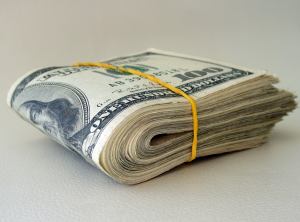There’s an idea floating around the world of psychology referred to as Social Comparison Theory. The basic idea is that people want to know how well they measure up to others in the world and so will compare themselves to others. While there’s obviously more to it than that (including some silly suggestions along the lines of people comparing themselves to others to feel better, rather than to do something adaptive with that information), the principle has been harnessed by researchers examining inequality. Specifically, it has been proposed that inequality itself makes people sad. According to the status-anxiety hypothesis, when it comes to things like money and social status, people make a lot of upwards comparisons between themselves and those doing better. Seeing that other people in the world are doing better than them, they become upset, and this is supposed to be why inequality is bad. I think that’s the idea, anyway. Feel free to add in any additional, more-refined versions of the hypothesis if you’re sitting on them.
“People are richer than me,” now warrants a Xanax prescription
As it turns out, that idea seems to be a little less than true. Before getting to that, though, I wanted to make a few general points (or warnings) about the research I’ve encountered on inequality aversion; the idea that people dislike inequality itself and seek to reduce it when possible (especially the kind that leaves them with less than others). The important point to make about research on inequality is that, if you are looking to get a solid measure of the effects of inequality itself, you need to get everything that is not inequality out of your measures. That’s a basic point for any research, really.
For instance, when examining research on inequality in the past, I kept noticing that the papers on the topic almost always contained confounding details which impeded the ability of the authors to make the interpretations of the data they were interested in making. Several papers looked at the effects of inequality on punishment in taking games. The basic set up here is that you and I would start with some amount of money. I then take some of that money from you for myself. Because I have taken from you, we either end up with you being better off, me being better off, or both of us being equal. After I take from you, you would be given the option to punish me for my behavior and, as it turns out, people preferentially punish when the taker ends up with more money than them. So if I took money from you, you’d be more likely to punish me if I ended up better off, relative to cases where we were equal or you were still better off. (This happens in research settings with experimental demand characteristics, anyway. In a more naturalistic setting when someone mugs you, I can’t imagine many people’s first thoughts are, “He probably needs the money more than me, so this is acceptable.”)
While such research can tell us about the effects of inequality to some extent, it cannot tell us about the effects of inequality that are distinct from taking. To put that in concrete example, my subsequent research (Marczyk, 2017) used that same taking game to replicate the results while adding two other inequality-generating conditions: one in which I could increase my payment with no impact on you, and another where I could decrease your payment at no benefit to myself. In those two conditions, I found that inequality didn’t appear to have any appreciable impact on subsequent punishment: if I wasn’t harming you, then you wouldn’t punish me even if I generated inequality; if I was harming you, you would punish me even if I was worse off. This new piece of information tells us something very important: namely, that people do not consistently want to achieve equality. When we have been harmed, we usually want to punish, even if punishing generates more inequality than originally existed. (That said, there are still demand characteristics in my work worth addressing. Specifically, I’d bet any effects of inequality would be reduced even further when the money the participants get is earned, rather than randomly distributed by an experimenter)
In terms of the research I want to talk about today, this is relevant because this new – and incredibly large – analysis sought to examine the effects of income inequality on happiness as distinct from the overall economic development of a country (Kelley & Evans, 2017). Apparently lots of previous work had been looking at the relationship between inequality within nations and their happiness without controlling for other important variables. The research question of this new work was, effectively, all else being equal, does inequality itself tend to make people unhappy? The simple example of this question they put forth was to imagine twins: John and James. John lives in a country with relatively low income-inequality and makes $20,000 a year. James lives in a country with relatively high income-inequality and makes $20,000 a year. Will John or James be happier? They sought to examine, on the national level, this connection between inequality and life satisfaction/happiness.
“At least we’re all poor together”
In order to get that all else to be equal, there are a number of things you need to control for that might be expected to affect life satisfaction. The first of these is GDP per capita; how much a nation tends to produce per person. This is important because it might mean a lot less for your happiness that everyone is equal if that equality means everyone lives in extreme poverty. If that happens to the be the case, then increasing industrialization of a nation can actually increase opportunities for economic advancement while also increasing inequality (as the rewards of such a process aren’t shared equally among the population, at least initially. After a time, a greater percentage of the population will begin to share in those rewards and the relationship between inequality and economic development decreases).
The other factors you need to control for are individual ones. Just because a society might be affluent, that does not mean that the person answering your survey happens to be. This means controlling for personal income as well, as making more money tends to make for happier people. The authors also controlled for known correlates of happiness including sex, age, marriage status, education, and religious attendance. It’s only once all these factors have been controlled for that you can begin to consider the effect of national inequality (as measured by the Gini coefficient) on life satisfaction ratings. That’s not to say these are all the relevant controls, but they’re a pretty good start.
Enacting these controls is exactly what the researchers did, pooling data from 169 surveys in 68 societies, representing over 200,000 individuals. If there’s a connection between inequality and life satisfaction to be found, it should be evident here. Countries were categorized as a member of either developing nations (those below 30% of the US per-captial GDP) or advanced ones (those above the 30% mark), and the same analyses was run on each. The general findings of the research are easy to summarize: in developing nations, inequality was predictive of an increase in societal happiness (about 8 points on a 1-100 scale); among the advanced nations, there was no relationship between inequality and happiness. This largely appeared to be the case because, as previously outlined, the onset of development in poorer countries generated initial periods of greater inequality. As development advances, however, this relationship disappears.
A separate analysis was also run on families in the bottom 10% of a nation in terms of income, compared with the families in the top 10% since much of the focus on inequality has discussed the divide between the poor and the rich. As expected, rich people tended to be happier than poor ones, but the presence of inequality was, as before, a boon for happiness and life satisfaction in both groups. It was not that inequality made the poor feel bad while the rich felt good. Whatever the reason for this, it does not seem like poor people were looking up at rich people and feeling like their life was terrible because others had more.
“Some day, all this could be yours…”
All this is not to say that inequality itself is going to make people happy as much as the things that inequality represents can. Inequality can signal the onset of industrialization and development, or it can signal there is hope of improving one’s lot in life through hard work. These are positives for life satisfaction. Inequality might also represent that the warlord in the next town over is very good at stealing resources. This would be bad. However, whatever the reason for these correlations, it does not seem to be the case that inequality per se is what makes people unhappy with life (though living in nations with high GDP and earning good salaries seem to put a smile on some faces).
I like this interpretation of the data, unsurprisingly, because it happens to fit well with my own. In my experiments, people didn’t seem to be punishing inequality itself; they were punishing particular types of behaviors – like the stealing or destruction of resources – that just so happened to generate inequality at times. In other words, people are responding primarily to the means through which inequality arises, rather than the inequality itself. This appears to be the case in the present paper as well. Most telling of this interpretation, I feel, is a point mentioned within the paper without much discussion (as its the topic of a separate one): the national data was collected from non-communist nations. Things are a little different in the communist countries. For those cohorts who lived their formative years in communist nations, inequality appears to have a negative relationship with happiness, though that dissipates in new, post-communist generations. From that finding, it seems plausible to speculate that communists might have different ideas about the means through which inequality arises (mostly negative) which they push rather aggressively, relative to non-communists. That said, those attitudes do not seem to persist without consistent training.
Reference: Kelley, J. & Evans, M. (2017). Societal inequality and individual subjective well-being: Results from 68 societies and over 200,000 individuals, 1981-2008. Social Science Research, 62, 1-23.
Marczyk, J. (2017). Human punishment is not primarily motivated by inequality. PLOS One, https://doi.org/10.1371/journal.pone.0171298



